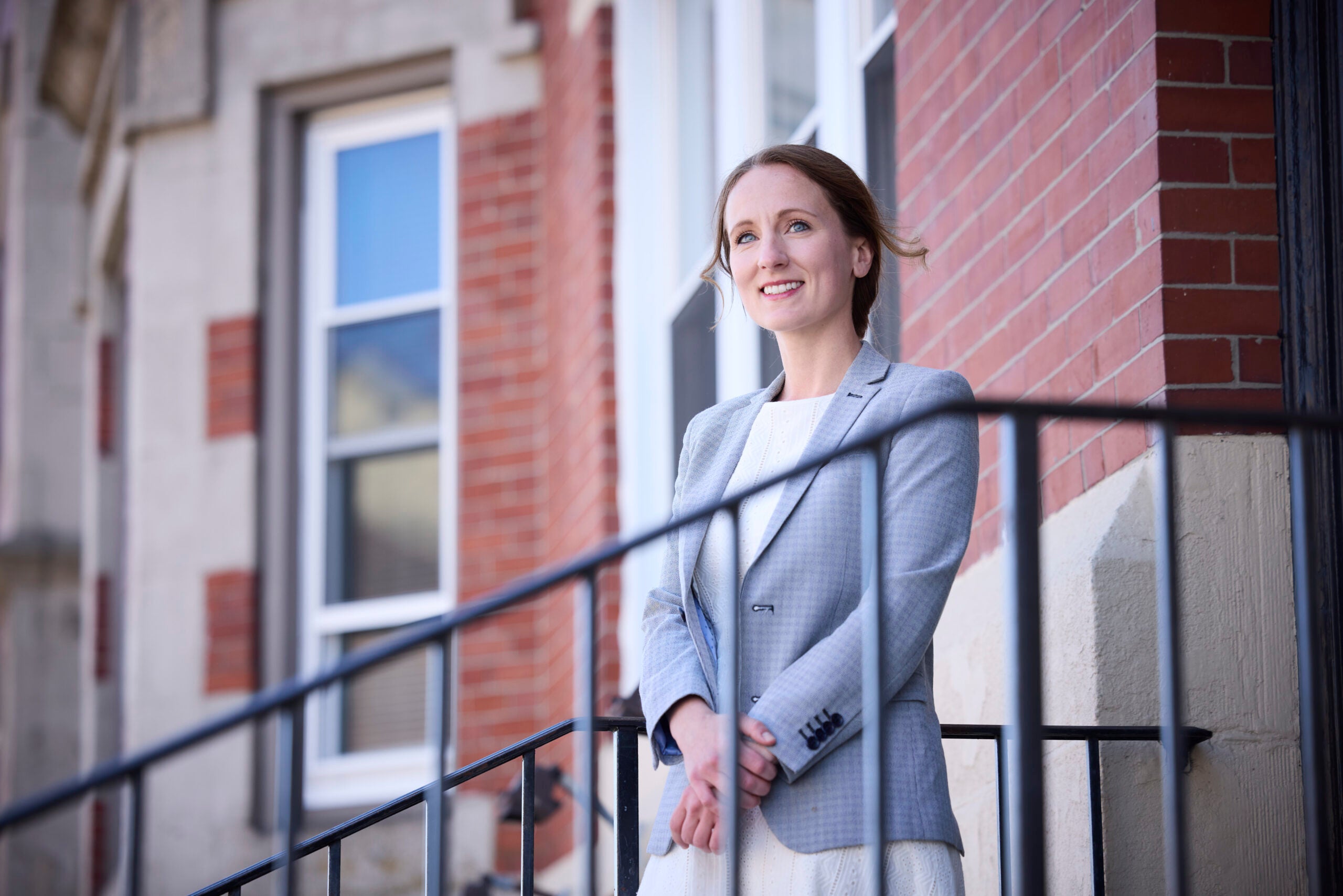Heather Soucy, MPH ’25, is using her new expertise in health policy to fill gaps in the U.S. health care system she witnessed as an emergency department nurse.
Growing up, Heather Soucy loved science, particularly anatomy, and felt determined to help people—penchants that easily steered her toward the health care field. After graduating from an accelerated nursing program at Johns Hopkins University in 2018, she began working as a pediatric emergency department (ED) nurse in Baltimore, where her caseload was “20% true life-and-death emergencies and 80% providing primary care” for families who faced barriers to routine doctor’s visits.
“Working downtown with a vulnerable population … there were a lot of inequities,” Soucy said. “We were trying really hard to give patients every resource they needed so they wouldn’t have to come back to the ED for non-urgent matters. But at the end of the day, we weren’t really able to.”
This sense of shortcoming followed Soucy as her career progressed. She went on to work as an ED nurse at a level one trauma center in Colorado. Then, during the COVID-19 pandemic, she worked as a travel nurse in a handful of other states, from her native Massachusetts to California. Each new experience left her more disillusioned with the U.S. health care system—which inevitably led to her feeling burned out.
“Limited staffing and resources among nurses have only gotten worse since the pandemic,” Soucy said. “There are just so many cracks in the system. It got to a point that every time I thought about my future, unfortunately, I couldn’t envision emergency room nursing being sustainable.”
That uncertainty, she said, was her motivation for applying to Harvard T.H. Chan School of Public Health.
“A lot of students at Harvard Chan School are driven to improve health outcomes, and I absolutely am too,” she said. “But I think a lot of my ‘why’ is also about improving the caregiving experience and making medicine a sustainable career again. Because I love my job. I wish I could have done it for another 30 years.”
Soucy enrolled in Harvard Chan School’s master of public health in health policy program feeling “open-minded” about where it may lead her. This month, she’ll graduate with a clearer vision for how she can work to improve the experiences of caregivers and patients alike.
Gaining confidence—and hope
Soucy quickly noticed that she stuck out in her MPH cohort. Her classmates in the 45-credit MPH in health policy program, which is designed for established health professionals and medical students, were nearly all physicians.
“During the first couple of weeks of the program, I felt a lot of imposter syndrome. Being the only nurse in my cohort made me feel like my voice didn’t carry the same weight as some of my classmates,” she said. “I realized, though, that I did have something important to contribute. My experiences as a nurse were valuable to—and valued by—my classmates.”
Soucy supplemented the program’s core curriculum, which spans biostatistics, epidemiology, social and behavioral sciences, health systems, and leadership, with classes at Harvard Law School and Harvard Kennedy School. Last fall, she took John McDonough’s class on U.S. health policy alongside a class on health care rights at the law school—a combination she compared to “learning a new language.”
“There was so much I didn’t know about the non-clinical side of health care, particularly how policies are written, implemented, and enforced,” Soucy said. “I had been so disappointed in our health care system and felt like we, as providers and patients, had been let down. Learning the history of health policy in our country, along with key laws and regulations that protect human rights, gave me a sense of hope. I now understand how and where I can focus my efforts to help influence change.”
Soucy got a direct glimpse into where health policy is written by participating in the Massachusetts Student Health Policy Forum, an annual event co-founded and co-organized by McDonough. She and other students met with officials from agencies including the Boston Public Health Commission, the Massachusetts Department of Public Health, and the Massachusetts Health Policy Commission, an experience she called “inspiring.”
Learning to be a leader
Soucy further gained confidence as an agent of change by completing the Public Health Leadership (PHL) concentration, which offered coursework, workshops, and mentoring, all centered on building leaderships skills. The concentration culminated in a retreat in early April, during which Soucy and her PHL cohort practiced team building and both group- and self-reflection.
One PHL highlight, she said, was a “360 assessment,” where participants received external feedback on themselves as leaders. Soucy ranked herself as a type-A, high-strung leader—a self-image that contrasted with others’ views of her as laid-back, adaptive, and understanding.
“I was reflecting on this discrepancy, and it occurred to me that maybe this also played a role in my burnout. When I was practicing nursing, I had all of these feelings and things to say about inefficiencies and gaps, and I never expressed any of them. Nobody knew I was unhappy with the care we were providing,” Soucy said. “Moving forward as a leader, I’m committed to speaking my truth, even if it’s uncomfortable, and raising the heat a little bit instead of being complacent.”
She noted that, thanks to the strong bonds she made through PHL activities, this kind of reflection will continue.
“I’ve made connections with [director of leadership development and PHL Lab director] Fawn Phelps, a number of leadership professors, and my cohort that I know will last beyond my time at Harvard Chan School,” Soucy said.
My head and my heart are committed to improving our health systems and health care delivery.
Heather Soucy, MPH ’25
Making Naloxone accessible in hospitals
For her practicum, Soucy put her health policy knowledge and leadership skills to the test working with the Massachusetts chapter of The Naloxone Project (TNP), a nationwide nonprofit that seeks to make Naloxone—the drug commonly known as Narcan that can reverse opioid overdoses—easily accessible to patients in hospital settings.
Currently in Massachusetts, the Community Naloxone Program (CNP) supplies low-cost bulk purchasing of Naloxone to community health organizations, homeless shelters, emergency medical services, fire and police stations, libraries, and other public service agencies. Staff at these agencies can hand out the drug to the public for free. In hospitals, however, Naloxone must be prescribed directly to a patient—a policy that can present significant barriers to providing the drug as widely as is needed. Soucy noted that it’s most often friends and family members of a patient who express interest in Naloxone, but that clinicians aren’t permitted to give it to them.
Patients most at risk for opioid overdose might feel uncomfortable accepting Naloxone for fear of judgement or stigma associated with their substance use, or face obstacles to filling a take-home prescription.
“TNP has done some surveys, and only about half of hospitals in Massachusetts are actually dispensing Naloxone to at-risk patients,” Soucy said.
With the Naloxone Project, Soucy has been working on legislation and advocacy efforts to expand the existing CNP to include hospitals. “The goal would be for hospitals to obtain bulk supplies of Naloxone that are ready to be dispensed freely to the community, without the need for insurance or billing,” Soucy said.
Emergency rooms are the most logical place to start. “People leaving the ED after an overdose are at highest risk for another overdose within two days,” Soucy said. “Having Naloxone readily available to distribute from EDs is lifesaving. It’s like sending a cyclist home on their bike with their helmet.”
She added that only about one percent of written prescriptions for Naloxone get filled.
“That’s why we need to emphasize putting the actual drug in people’s hands,” she said. “Not prescriptions.”
For Soucy, work to expand access to Naloxone in hospitals is personal: She lost a friend to an accidental opioid overdose in high school, and working in emergency rooms, she witnessed countless tragedies and even more close calls. It’s also professionally resonant, a concrete example of how to use policy to equip nurses and other health care workers with tools they need to best care for the communities they serve—resources that she so often wished for as a nurse.
“This is exactly the kind of work I hope to be doing,” Soucy said. “I’m asking myself how I can make the biggest change using my clinical experiences at patients’ bedsides and the education I now have.”
Soucy hopes to continue her work with TNP after graduation. She’ll also soon begin working as a legal nurse, providing clinical expertise to attorneys working on medical cases.
“I hope to give patients who have been harmed a chance to have their voices heard, to feel genuinely advocated for, and to be part of the systemic change our health care system needs,” Soucy said. “My head and my heart are committed to improving our health systems and health care delivery.”



